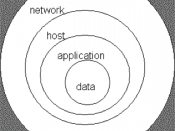Computer Security Legislation in Major IndustriesComputer security refers to a method of protecting data from being accessed, modified, used, revealed, or disrupted by unauthorized persons or organizations. There are three core principles of information security namely, confidentiality, integrity, and availability.
Breach of information is what happens whenever certain information is captured by unauthorized party. This may occur accidentally or intentionally. These are:ÃÂinterception of messagesÃÂtheft of stored dataÃÂinformation sabotageÃÂspoofing; and,ÃÂdenial of service.
Any breach of information in business industries could mean financial loss for NHG. The data stolen have many uses in the hands of a hacker. The data can be sold to rival companies to earn money. Others that hack bank and credit card systems steal money from private accounts. Table 1 shows the total losses in global bank card fraud.
Table 1. Global bank card fraud (losses per US$ 100 Volume).
YearLosses (billions)1998$2.01999$2.32000$2.72001$3.32002$3.8Source: The Nilson Report, June 2003These industries try to strengthen computer security in many ways.
The most common method is the use of modern data protection software programs such as anti-virus software, firewall, and encryption software.
In most banks, private data is usually encrypted so that the hacker will not be easily stolen. This method of data protection uses codes to prevent data from being read by unauthorized parties. This is commonly used in large on-line stores such as eBay and Amazon.com.
Computer Security Standards in Healthcare IndustryAccording to the World Health Organization healthcare is goods and services that is intended to promote health, including prevention, cure, and analgesic relief.
Healthcare systems put the use of computer systems to the limit. There are three main uses of computers in healthcare institutions: (a) collect data faster, (b) store data for future use, and (c) share data to parties other than the institution and the patient.
Protection of health...



Nden
I thought this was a good start for a paper. I would add additional information.
1 out of 2 people found this comment useful.